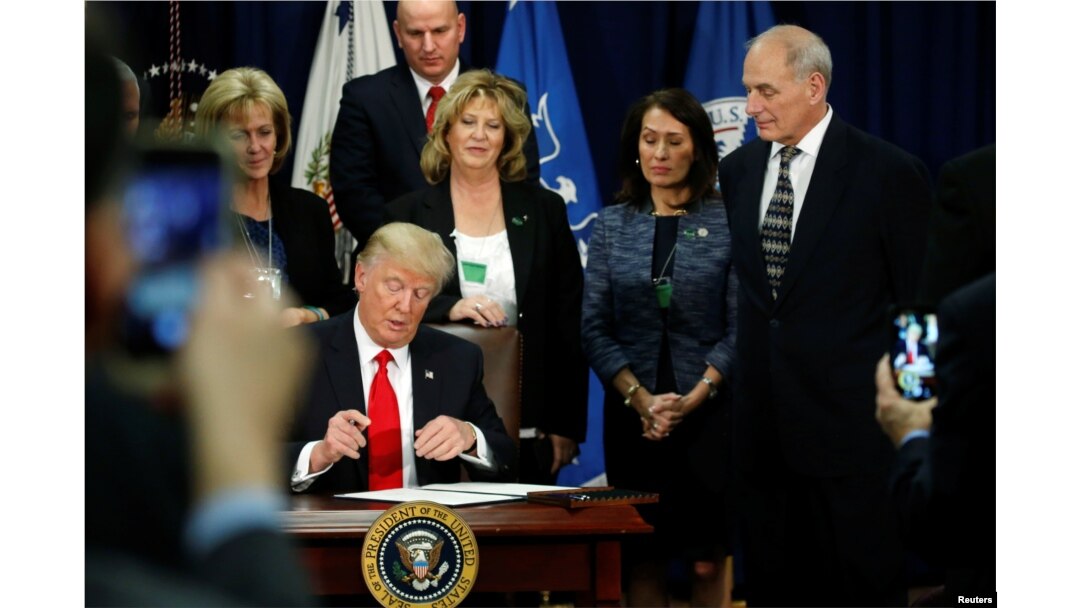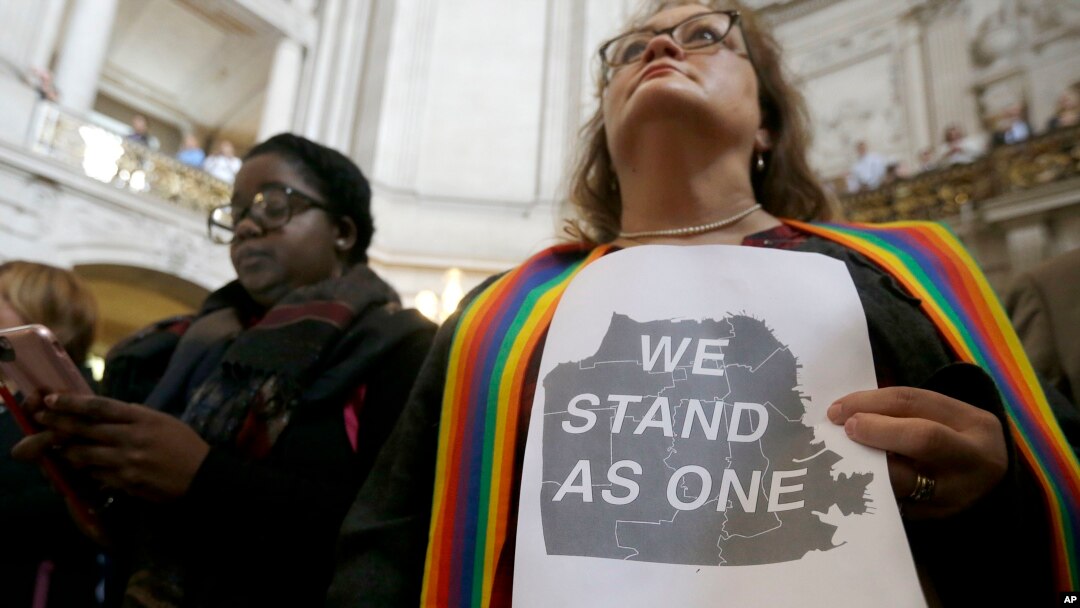Signing an executive order is one thing; enacting it may be another.
President Donald Trump signed an order Wednesday that he said would "crack down on sanctuary cities" by withholding federal grant money.
Sanctuary cities limit help to federal authorities who may be looking to arrest and deport undocumented immigrants. Forty U.S. cities and 364 counties nationwide have established themselves as sanctuary places.
White House Press Secretary Sean Spicer said federal authorities are going to "unapologetically" enforce the law.

U.S. President Donald Trump signs an executive order at Homeland Security headquarters in Washington, D.C., Jan. 25, 2017.
"We will strip federal grant money from sanctuary states and cities that harbor illegal immigrants. ... The American people are not going to be forced to subsidize this disregard for the law," Spicer said. Federal grants are U.S. economic aid that come from general revenue and are used to pay for various services, such as community centers, health clinics and housing for low-income people.
Federal grants are U.S. economic aid that come from general revenue and are used to pay for various services, such as community centers, health clinics and housing for low-income people. The cities individually could lose millions of dollars in federal aid. Many of the cities, including some of the biggest in the country, are located in states that Trump won in the November election.
But New York state Attorney General Eric Schneiderman says Trump does not have the constitutional authority to cut off funding to sanctuary cities.
At least 12 cities in New York have declared themselves safe for illegals, including New York City.
"Any attempt to bully local governments into abandoning policies that have proven to keep our cities safe is not only unconstitutional, but threatens the safety of our citizens,” Schneiderman said Wednesday. "I urge President Trump to revoke the executive order right away. If he does not, I will do everything in my power to fight it."
FILE - New York Attorney General Eric Schneiderman speaks in New York, June 28, 2016.
A top U.S. immigration lawyer says only Congress can cut federal funding to cities in the United States.
"[President Trump] cannot take away funds," said Paromita Shah, associate director at the National Immigration Project of the National Lawyers Guild. She added, however, the president can move grant money around.
"I think he is also saying that he can shift funds," she said. "So if he is threatening to take away funds, there is a distinction between whether he wants to shift how funds are used. And I think we have to watch and see how he does it."
Shah added that it will be "interesting" to see if the president tries to undo Congressional decisions. If he does, she says, "he will be on shaky grounds."
Legal status
Another view is that there is no legal definition for a sanctuary city; they are not a legal entity. This means, according to Washington immigration lawyer Mark Shmueli, the cities are not breaking federal law and cannot be penalized by the Trump administration.
FILE - Immigrant rights activists chant during a sanctuary city rally held in National City, California, Sept. 30, 2006.
"To cut off all federal funding to the majority of the largest cities and population centers in the United States would be unprecedented, and it would certainly economically destroy those places and harm the economy of the United States," Shmueli said.
But Anand Ahuja, a lawyer and co-founder of Indian-Americans for Trump, said cities should be held accountable.
"If a mayor of a particular city protects illegal immigrants in his or her county or town ... the mayor should be liable," Ahuja said.
"If you look into the history, it was actually under [former President] Bill Clinton in 1996 that illegal-immigration reform was passed that specifically says that local governments are to cooperate with the department of homeland security and immigration and custom enforcement," he added.
Ahuja noted that while presidents have executive powers, "if you want to make long-lasting law then it has to be passed by the Congress."
Congressional action
The sanctuary movement began in the 1980s when church congregations across the United States began providing shelter to asylum-seekers fleeing civil war in Central America.
Democratic House Minority leader Nancy Pelosi, who represents the sanctuary city of San Francisco, blasted both of Trump’s executive orders targeting the cities and the construction of a border wall with Mexico.
“With today’s sweeping and constitutionally suspect executive actions, the president is turning his back on both our history and our values as a proud nation of immigrants,” Pelosi said. “Wasting billions of taxpayer dollars on a border wall Mexico will never pay for, and punishing cities that do not want their local police forces forced to serve as President Trump’s deportation dragnet does nothing to fix our immigration system or keep Americans safe.”
But proponents of tougher immigration laws, like Republican Senator Pat Toomey of Pennsylvania, object to sanctuary cities.
"We confer this special privilege on, in many cases, dangerous, violent criminals because they came here illegally," Toomey said. He's proposed legislation that would strip cities of federal development assistance if they fail to cooperate with federal authorities.
The impact of his bill, called the Stop Dangerous Sanctuary Cities Act, would fall mainly on low-income neighborhoods that rely on the federal aid for affordable housing and public services.
Others said if local officials follow the Illegal Immigration Reform and Immigrant Responsibility Act of 1996, then authorities are expected to cooperate with immigration enforcement.


